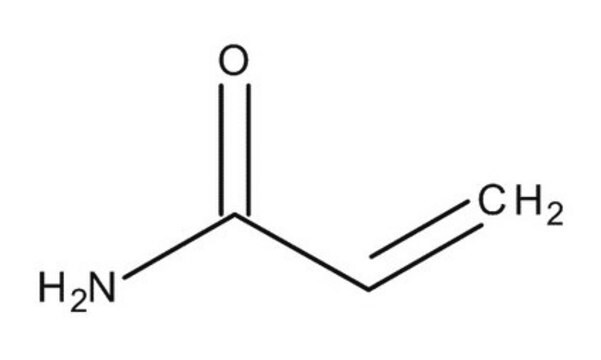01697
Acrylamide solution
40% in H2O, for molecular biology
About This Item
Recommended Products
grade
for molecular biology
Quality Level
form
liquid
concentration
40% in H2O
technique(s)
electrophoresis: suitable
impurities
DNases, none detected
RNases, none detected
phosphatases, none detected
proteases, none detected
anion traces
chloride (Cl-): ≤50 mg/kg
sulfate (SO42-): ≤50 mg/kg
cation traces
Ca: ≤5 mg/kg
Cd: ≤1 mg/kg
Co: ≤1 mg/kg
Cr: ≤1 mg/kg
Cu: ≤1 mg/kg
Fe: ≤1 mg/kg
K: ≤10 mg/kg
Mg: ≤5 mg/kg
Mn: ≤1 mg/kg
Na: ≤50 mg/kg
Ni: ≤1 mg/kg
Pb: ≤1 mg/kg
Zn: ≤1 mg/kg
suitability
in accordance for electrophoresis test
storage temp.
2-8°C
SMILES string
NC(=O)C=C
InChI
1S/C3H5NO/c1-2-3(4)5/h2H,1H2,(H2,4,5)
InChI key
HRPVXLWXLXDGHG-UHFFFAOYSA-N
Looking for similar products? Visit Product Comparison Guide
Signal Word
Danger
Hazard Statements
Precautionary Statements
Hazard Classifications
Acute Tox. 4 Inhalation - Acute Tox. 4 Oral - Carc. 1B - Eye Irrit. 2 - Muta. 1B - Repr. 2 - Skin Irrit. 2 - Skin Sens. 1 - STOT RE 1 Oral
Target Organs
Peripheral nervous system
Storage Class Code
6.1C - Combustible acute toxic Cat.3 / toxic compounds or compounds which causing chronic effects
WGK
WGK 3
Flash Point(F)
Not applicable
Flash Point(C)
Not applicable
Personal Protective Equipment
Choose from one of the most recent versions:
Certificates of Analysis (COA)
Don't see the Right Version?
If you require a particular version, you can look up a specific certificate by the Lot or Batch number.
Already Own This Product?
Find documentation for the products that you have recently purchased in the Document Library.
Customers Also Viewed
Protocols
HPLC Analysis of Acrylamide and Acrylic Acid on Discovery® HS F5
Our team of scientists has experience in all areas of research including Life Science, Material Science, Chemical Synthesis, Chromatography, Analytical and many others.
Contact Technical Service





